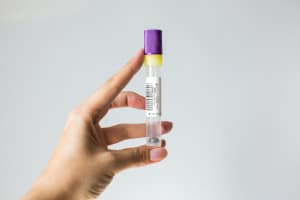
We spoke to Sergey Musienko, Co-Founder and CEO of Atlas Biomed, a health company that offers direct-to-consumer products for both genomic and microbiome analysis helping to take control of your health through actionable, personalised recommendations. Sergey is a bioinformatician with over a decade’s worth of experience using technology to address healthcare needs.
How long has Atlas Biomed been in the DNA testing industry and what was the inspiration for starting the company?
Back in 2011 I was awarded a place at the Singularity University in Silicon Valley, a unique place that recruits entrepreneurial minds to explore how emerging technologies can shape the future. And that is where the seed of Atlas was born. Having worked on projects in hospital settings, I could see how precision technologies could help develop personalised solutions to address the world’s growing burden of chronic illness. As DNA technologies became widespread and costs fell, this new market finally emerged, and so did Atlas.
So, I brought together a fantastic team of scientists and bioinformaticians who developed the Atlas DNA Test and Atlas Microbiome Test. These two tests generate unique health profiles and provide actionable, personalised recommendations so people can take control of their health. We launched commercially in Europe in 2016, and since then the company has quickly expanded with sales in 16 countries across Europe as well as Canada with hopes to establish in the US soon.
What sets Atlas Biomed apart from other testing services?
Essentially, we’ve created an ecosystem for preventive health that identifies modifiable risks and provides guidance on how to mitigate them. Our aim since the beginning has been to develop technologies, results and recommendations that empower people at home to make changes that are scientifically proven to help prevent illness. We’re not just telling people to eat kale and wear sunscreen; we’re tailoring lifestyle and dietary measures to each user’s unique genetic profile. Each one is backed up by evidence-based research and presented in clear English because we know that, to build a healthier future, we need to strengthen the public’s health literacy too.
Could you tell us a bit more about the difference between the two tests that you offer?
On the surface, the difference is quite simple. The Atlas DNA Test analyses human DNA, whereas the Atlas Microbiome Test looks at the DNA of the bacteria that live in the human gut. You only need to do a DNA test once because it never changes, but your microbiome is dynamic – it responds to changes in your diet and health, meaning that you can do the test as many times as you like (we recommend 3-month intervals) to see how your bacteria evolve over time.
What really makes the difference is the user’s intentions and goals. If you’re concerned about potential health risks or following in the footsteps of Rebel Wilson and want to make 2020 your “year of health”, then you might lean towards our DNA test. It’s not limited to your genetic traits, our algorithm incorporates comprehensive background data on your medical history and lifestyle to identify opportunities you can leverage to strengthen your body’s physical resilience and health outcomes.
But if it’s gut health, food or whether you need probiotics, then the microbiome test might be the one for you. Of course, the results aren’t limited to these areas (it even looks at disease protection conferred by your gut microbes), but it resonates with the public’s renewed interest in cooking and helps people to make informed eating choices. Rather than telling you what you shouldn’t eat, our algorithm helps you broaden your dietary horizons with ten personalised food recommendations each week to support microbiome functions.


What kind of information can be discovered through your testing and how could this change the way that people live?
The Atlas Microbiome Test focuses on the trillions of microbial cells in the colon. First off, you’ll discover your microbiome diversity rating. Like in nature, diversity is an indicator of ecosystem health, and research shows that the same principle applies to the microscopic life in our colons too. After that, the results dig deeper into specific functions like synthesis potential for essential nutrients like vitamins and butyrate. The test also looks at the probiotics and beneficial bacteria in your gut and how good they are at breaking down dietary fibre.
Knowing about your gut bacteria can help you make the right choices to maintain this essential ecosystem, which influences everything from body weight and blood sugar levels to heart health. After all, adding foods that benefit the good bacteria in your gut is much cheaper and easier than sourcing expensive supplements, and you can even compare how well it’s working with repeat testing.
When you take an Atlas DNA test, you unlock 20 multifactorial disease risks, your carrier status for 317 hereditary diseases, nutrition reports, as well as sports, and personal and ancestry traits. It comes with a free in-depth health survey to assess other important health factors like your family history of disease, environmental and lifestyle risks.
These insights generate some very practical tips for users. For example, it may recommend you contact your doctor about additional screening if our test identifies health traits that need further investigation. But it also looks at your day-to-day habits, highlights if you need more exercise, how much sleep you should try to get, and whether you have a genetic predisposition to lactose intolerance that should be monitored.
How difficult is it for a layperson to understand your product results and reports?
As a direct-to-consumer DNA testing company, we’ve dedicated a lot of thought, time and resources to how the results are displayed, and the language used. There’s plenty of evidence highlighting the importance of correctly conveying genetic test results, and we believe that our users’ ability to understand and correctly use this information is of primary importance.
We’ve designed an interface with enhanced visual design for easy navigation that can be accessed online and in the Atlas Health app in an easy to understand visual manner. We have made exceptional efforts to provide as much pre-test information as possible in order to inform users of the benefits and risks associated with discovering their personal genetic information. We also provide Genetic Counselling and Microbiome Nutrition Counselling services for users who have taken the test and would like expert insight on how to manage the information revealed by their results.
Which trends or technologies do you expect to see more of within the industry in the coming years?
Having our feet firmly planted in cutting-edge health tech, I can honestly say that there are exciting times ahead. In particular, I expect some extraordinary changes in healthcare thanks to the remarkable advances in genomics and AI.
At a user level, smart technology is going to transform how we make decisions, removing the guesswork and replacing it with tangible, data-driven guidance. Take our most recent addition – the Atlas Food Diary. This new app feature allows users to snap pictures of each meal and AI does the work of identifying the ingredients and rating them based on how each one influences that person’s gut bacteria. We’re also looking at integrating data from wearables (like smart watches) to circumvent the potential inaccuracies of self-reporting and memory recall.
In the mid-term, molecular technologies for preventive medicine will likely claim a greater share of operations within national and private healthcare systems. After all, major causes of mortality and public health expenditures are directed towards chronic and preventable diseases like obesity, diabetes type 2 and heart disease that can be addressed upstream by lifestyle and diet. The devastation and heartbreak wrought by the COVID-19 pandemic have also served as a wake-up call to take a long hard look at how we deal with health at a population level, starting with people in their own homes.
When it comes to the technology of the future, transcriptomics gets my vote. Although it’s still early days, the principles behind it are sound. The human body is not inert, it is constantly seeking balance, using molecules to adjust our internal settings. But these molecules don’t appear out of thin air – they are encoded by genes, and our genes are sensitive to our internal and external environments. In short, there’s good evidence to suggest that our genes don’t always act the same. For example, your diet can modify gene activity, and even gut bacteria have been shown to influence gene expression in mice. And that’s what transcriptomics is all about – technology that could analyse molecular changes in gene expression to gain deep insights into human disease.
To discover more about Altas Biomed head on over to www.atlasbiomed.com

